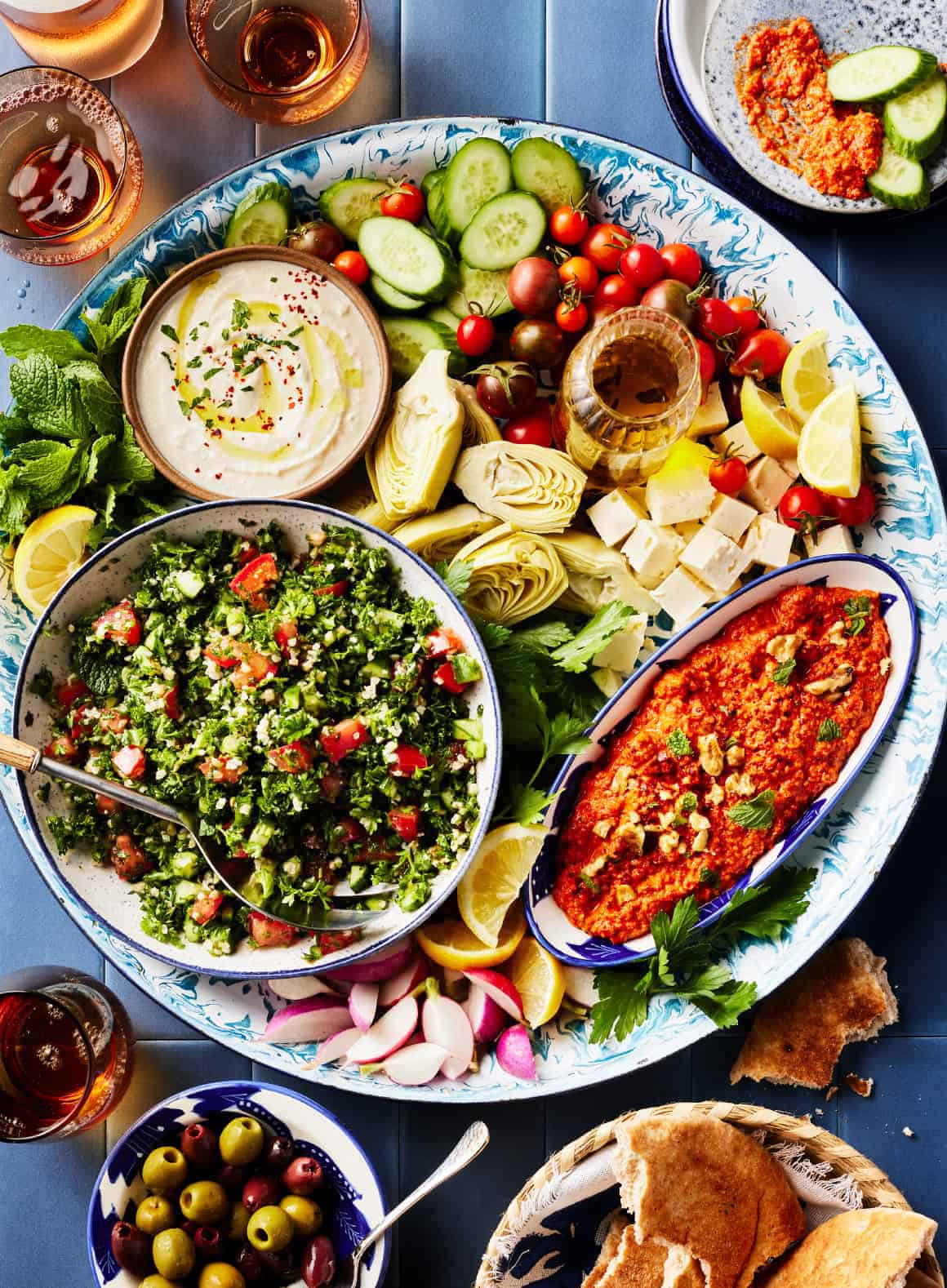Why Mediterranean Food Is the Ultimate Blend of Nutrition and Deliciousness
Mediterranean cuisine distinctively synthesizes nourishment and taste, supplying a diverse array of ingredients that cater to both the taste buds and the body. What makes Mediterranean food really extraordinary may stun you.
Secret Ingredients of Mediterranean Cuisine
While the Mediterranean diet regimen is commemorated for its health and wellness benefits, it is the vital ingredients that specify its rich cooking landscape. Central to this food are fresh fruits and vegetables, which are varied and abundant, supplying necessary nutrients and vibrant flavors. Staples like tomatoes, peppers, eggplants, and leafy eco-friendlies are frequently featured, showing the area's farming bounty.
Olive oil attracts attention as a hallmark active ingredient, valued for its flavor and healthy monounsaturated fats. It works as the primary fat source, boosting both preference and dietary worth in dishes. Legumes, such as lentils and chickpeas, provide plant-based healthy protein and fiber, adding to the diet's robustness.
In addition, entire grains, including farro and quinoa, are integral to Mediterranean dishes, giving a resource of complex carbs. Seeds and nuts additionally play a substantial duty, providing healthy and balanced fats and a gratifying problem.
Wellness Benefits of Mediterranean Diet
The Mediterranean diet regimen is not just renowned for its abundant tastes but also for the countless wellness benefits it provides. This dietary pattern, characterized by high intake of fruits, vegetables, entire grains, nuts, and healthy and balanced fats, particularly olive oil, has actually been connected to numerous favorable health outcomes.
Research suggests that sticking to the Mediterranean diet regimen can decrease the threat of chronic diseases such as heart illness, diabetes, and stroke. The wealth of anti-oxidants and anti-inflammatory substances located in this diet regimen promotes cardio health and wellness, lowering blood pressure and improving cholesterol levels. Furthermore, the diet regimen's focus on healthy fats sustains healthy and balanced mind feature and may reduce the danger of neurodegenerative conditions.
Moreover, the Mediterranean diet regimen has been connected with improved weight management and lower rates of excessive weight. The concentrate on whole, minimally processed foods urges satiation and nutrient density, making it less complicated to maintain a healthy and balanced weight.
Taste Profiles That Pleasure
At the heart of Mediterranean cuisine exists a lively tapestry of flavors that captivates the taste and showcases the area's diverse culinary heritage. This cuisine is defined by an exquisite equilibrium of fresh, wholesome ingredients, each adding to a symphony of preferences that range from full-flavored to tangy, and wonderful to earthy.
The basic taste profiles are shaped by essential components such as olive oil, garlic, herbs, and spices. Olive oil gives a rich, fruity base, while garlic adds a robust deepness to dishes. Fresh natural herbs like basil, oregano, and parsley jazz up meals with their fragrant high qualities, boosting the overall index sensory experience.
In addition, using citrus fruits such as oranges and lemons presents a refreshing acidity, including and brightening tastes intricacy. The unification of seasonal vegetables-- such as tomatoes, eggplants, and bell peppers-- further enhances the palette with natural sweetness and umami.
Cheeses, like feta and pecorino, add creamy textures and saltiness, completing dishes perfectly. This unified interaction of tastes not just pleases the taste but likewise reflects the Mediterranean ethos of commemorating fresh, quality ingredients in every meal.

Social Relevance of Mediterranean Food
Mediterranean food is not simply a collection of dishes; it symbolizes the social heritage and customs of the areas surrounding the Mediterranean Sea (moroccan restaurant las vegas). This food reflects the varied histories, agricultural practices, and social customs of nations such as Greece, Italy, Spain, and Morocco. Each dish narrates, frequently rooted in local ingredients and ancient methods, showcasing a deep link to the land and its people
The common facet of Mediterranean dining is especially considerable, as dishes are often delighted in with friends and family, cultivating a sense of neighborhood and togetherness. Celebrations and parties often focus on food, where conventional dishes are common and ready, strengthening cultural identity.
Additionally, Mediterranean food highlights the importance of fresh, seasonal components, which not just supports regional economies but likewise advertises sustainable techniques. This viewpoint is deeply intertwined with the Mediterranean lifestyle, which values balance, moderation, and enjoyment of life.
Fundamentally, Mediterranean food acts as a living testimony to the abundant tapestry of background, society, and social interaction, making it a lot more than plain nourishment; it is a celebration of life itself.
Easy Mediterranean Recipes to Attempt
Discovering the vibrant tastes of Mediterranean cuisine can be both satisfying and obtainable, even for newbie cooks. With its focus on fresh ingredients, strong flavors, and straightforward food preparation methods, Mediterranean meals can conveniently be integrated into your cooking repertoire.
One great dish to attempt is the timeless Greek salad. Incorporate diced cucumbers, ripe tomatoes, red onions, Kalamata olives, and her response feta cheese, dressed with olive oil, lemon juice, and oregano. This dish is revitalizing and packed with nutrients.
One more easy option is the Mediterranean quinoa bowl. Prepare quinoa and mix it with cherry tomatoes, bell peppers, cucumbers, and a sprinkle of parsley. Drizzle with an easy lemon-olive oil dressing for a wholesome dish.
For a flavorful side, think about roasted veggies. Toss zucchini, bell peppers, and eggplant in olive oil, salt, and herbs de Provence, after that roast up until tender. This dish improves any primary course while supplying a vivid, nutrient-rich addition to check your table.
Finally, attempt making a fast hummus. Mix chickpeas, tahini, garlic, lemon juice, and olive oil up until smooth. Serve with pita bread or fresh veggies for a wonderful appetizer. These dishes are not just very easy to prepare yet likewise show the Mediterranean commitment to wellness and taste.

Final Thought
In verdict, the Mediterranean diet plan exhibits a harmonious combination of nourishment and taste, defined by its reliance on fresh, entire components. As individuals seek healthier dietary choices, Mediterranean food uses a delicious solution that advertises overall wellness while celebrating cooking practices.
Mediterranean cuisine distinctively synthesizes nutrition and taste, providing a varied array of ingredients that provide to both the taste and the body.While the Mediterranean diet is commemorated for its health benefits, it is the key ingredients that define its rich culinary landscape.Mediterranean food is not just a collection of recipes; it symbolizes the cultural heritage and practices of the areas surrounding the Mediterranean Sea. moroccan restaurant las vegas. These dishes are not only very easy to prepare but also show the Mediterranean commitment to health and wellness and flavor
In conclusion, the Mediterranean diet plan exemplifies a harmonious integration of nourishment and taste, identified by its dependence on fresh, entire ingredients.